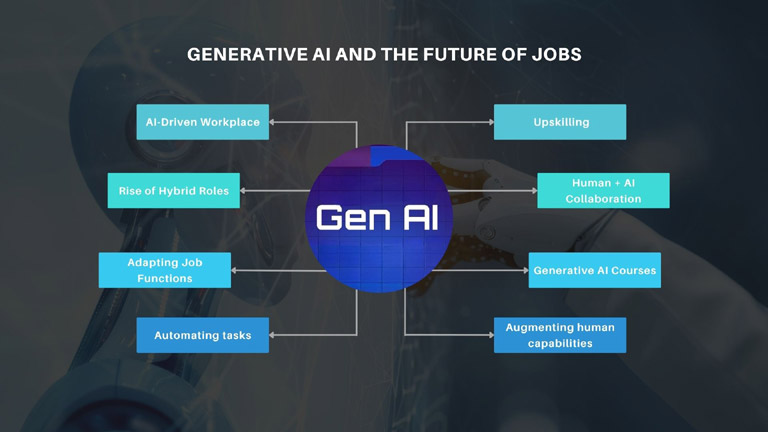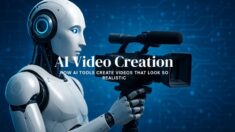
In today’s world, generative AI is no longer confined to the laboratory but has become a part of everyday work. Recent surveys show that a large number of organizations are now routinely using generative AI, and many companies are redesigning their workflows to reap the benefits of AI. For example, according to industry surveys, by 2024-25, more than two-thirds of organizations will be regularly using generative AI in some business function. This shift isn’t just about speeding up work, but also transforming the way you work and job roles.
Your workplace will now feature tools that help you write, code, and summarize data. These tools not only save time but are also transforming the division of work and responsibilities. For developers, code assistants mean less time spent on repetitive tasks and more focus on system design. Marketing and content teams are increasingly relying on AI to create personalized content. This shift means that learning to work effectively with AI can accelerate your career growth.
Here’s what this shift looks like:
- Developers use AI coding assistants to write, test, and optimize code faster.
- Designers create visuals, interfaces, and mockups in minutes using AI design tools.
- Product managers use AI to analyze feedback, forecast demand, and ideate new features.
- Marketers rely on AI to personalize content and automate audience insights.
- HR teams use AI to screen resumes, design learning paths, and manage employee engagement.
AI has become a silent teammate, and those who know how to work with it are rising faster in their careers. So, it is a perfect time to enroll in generative AI courses if you are someone looking to climb the career ladder.
2. The Rise of Hybrid Roles
Many traditional job boundaries have blurred. New roles are emerging that combine technical and non-technical skills. For example, prompt engineers are becoming professionals who design questions and instructions to extract the best output from AI. Similarly, demand for AI product managers, AI trainers, and ethics specialists is growing. Mastering these hybrid skills can make you more valuable in your field. This shift suggests that success today is measured not just by technical knowledge but by the ability to collaborate with AI.
3. How Big Tech Is Adapting Job Functions
Code completion and AI-assisted tools have transformed everyday processes in software engineering. Engineers are now spending more time reviewing system architecture and logic rather than writing robotic code. Therefore, if you are a developer, effectively communicating with AI and evaluating generated code becomes your newfound strength.
Marketing and Content
Content generation in marketing has accelerated. AI can create the first draft of your content and help with audience segmentation. However, creative strategy and a human touch are still essential. If you are a marketer, learning prompt-driven strategies and content personalization can help you get ahead of the competition.
Data and Analytics
Models in data analysis can now create instant reports and visualizations. This means that data analysts are now focusing more on business meaning and strategy, moving away from routine reporting. Your role now involves translating AI-based insights into practical decisions.
Human Resources
In HR, talent screening and training are changing. AI helps with resume scanning and learning path design. But human understanding, empathy, and ethical judgment are what AI cannot. Therefore, HR professionals must learn both AI literacy and ethics.
4. Beyond Big Tech: Generative AI Across Industries
AI is helping create patient summaries and treatment plans in healthcare. Research and compliance reports are being automated in finance. In education, teachers are creating customized exercises and classroom materials. The use of AI predictive maintenance and digital twins is increasing in manufacturing. The purpose of AI in every industry is the same as it is in your workplace: increasing efficiency and empowering human expertise.
5. Why Upskilling in Generative AI Matters
Having AI skills is no longer optional for securing your future. Surveys show that the impact of AI is particularly visible in organizations that have redesigned workflows. Developers and professionals have reported that the use of AI can yield substantial improvements in productivity, typically ranging from ten to thirty percent. Therefore, learning the practices, prompt engineering, and ethical use of generative AI will open doors to new opportunities.
6. What You Will Learn in Generative AI Courses
A good generative AI course will cover fundamentals, how generative models work, prompt design, ethics, and practical projects. You’ll be able to conduct practical case studies of text, image, and data generation. After learning these skills, your work will focus on collaborating with AI to deliver better results.
7. The Future of Work: Human + AI Collaboration
The future of work won’t be completely dominated by machines. In essence, humans and machines will make decisions together. Your most valuable abilities will be those that machines can’t, such as creative thinking, ethical judgment, understanding complex problems, and finding new paths. If you learn to work with AI today, you will be among those leading the change in the years to come.
In the last,
Generative AI has changed the rules. Big Tech is leading the way, but the impact is visible in every sector. Your wisest move is to embrace AI not as a threat, but as an ally, and keep yourself updated to understand it. By doing so, you will not only speed up your work but also strengthen your career.
Taking a structured generative AI certification is one of the smartest ways to future-proof your career. It’s not just about learning tools, it’s about learning a new way of thinking.
In the era of AI collaboration, your most valuable skill won’t be doing what machines can, it will be guiding them to do what only you can imagine.


